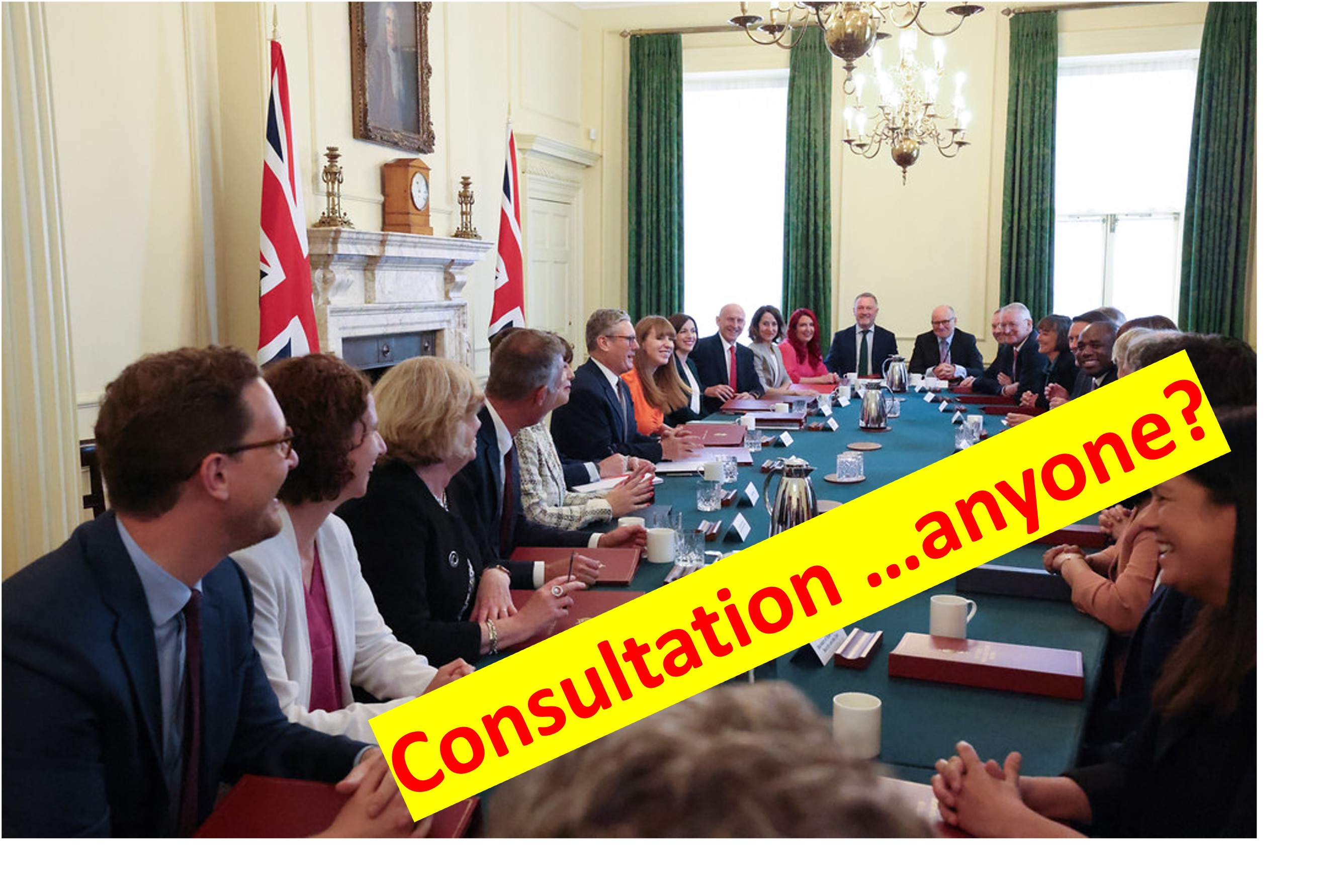This is Blog no 74
Historically, the months following a General Election have seen a hive of consultation activity. The first weeks of the 2010 Government was particularly frenetic as so many issues needed to accommodate the differences between the Coalition partners.
But when Governments win big and strong, the initial instinct is seldom consultative. Especially if incoming Ministers have a very clear idea of what they want to do, and how they want will accomplish it.

For the moment, let’s exclude the issues where the election manifesto has explicitly committed to a consultation. Labour has several specific commitments including on its ’Making Work Pay’ proposals, the development of its Social care policy and on House of Lords reform. But elsewhere, Ministers will need to decide the extent to which consultation is desirable.
There will be many inside the Government machine who will argue against consultation:
- It will cost money and slow you down; go for speed!
- We need quick wins; it was in the Manifesto!
- It’s a sign of weakness – and maybe suggest you’re not totally wedded to your original plan.
- It signals that you are prepared to compromise on details; stick to your guns!
- It will complicate matters and you may have to make concessions to the stakeholders who shout loudest.
In reality, there are very good reasons why wise Ministers opt to consult.
- Experienced politicians know that even the best preparation from the Opposition benches rarely matches the expertise of the UK civil service in delving into the detail of policy options and spotting the inevitable bear-pits lying in wait for the unwary. Even with the support of think-tanks that have, in many ways replaced the role of civil servants in policy development, proposals fashioned ahead of a General Elections are seldom free of glitches or anomalies that can affect the implementation of new legislation or new policies. Consultation can help smooth out the rough edges ….
- Consultation enhances legitimacy. Even the most high-profile element of a Manifesto can fail to attract public support. People vote for a variety of reasons, and in the recent election, the evidence suggests that many voted tactically – not so much for a party and its manifesto, but against an incumbent. It makes it difficult for politicians to argue “Well it was in our Manifesto, and they voted for us.” By holding a consultation, Ministers are, in effect acknowledging that they need to do more to check how much support a specific policy proposal enjoys.
- There are usually ‘winners’ and ‘losers’. Not always, but those affected by new laws or new policies have an expectation that they be consulted. Technically, the Courts might not always agree, but it does not alter the political perception. Hence the growing importance of impact assessments, which are required for new legislation anyway. There are often key stakeholders without whose co-operation, new policies cannot be effectively implemented. Just witness the trouble Andrew Lansley encountered with his ill-fated reorganisation of the NHS over a decade ago. Almost every key stakeholder organisation thought it was a mistake! Consultation obliges one to have a dialogue with those most affected, and can provide early warning of problems ahead.
- Finally, it is good politics to show that politicians are listening. Within a few weeks only the ‘geeks’ will have the remotest idea of what this party or that might have published in their Manifestos. But everything that feels controversial or engages the public and the media in genuine debate warrants some form of formal dialogue. On issues that impinge on people’s daily lives like net-zero or NHS primary care, there is widespread scepticism that any of the politicians have the answers. All the more reason therefore to widen the debate and seek public and stakeholder input on difficult decisions.
There is another reality. Over the next five years, we will see more and more Citizens Assemblies and equivalents. Although best organised by Governments, other organisations can take the initiative. Essentially, if the politicians don’t do it, someone else will! Except for some non-partisan matters or those ‘wicked issues’ which politicians are happy to delegate to others, Ministers are wary of ceding control of the dialogue. Yet another reason to consult.
There is a lot wrong with current Whitehall practice. Hence my call for an OFFICE of PUBLIC ENGAGEMENT or other improvements (Blog 73). I hope the Labour Government will look seriously at these and restore trust in the process. In the meantime, however – if used intelligently, well-designed consultations will help Ministers take better decisions and enhance their relationship with civic society and relevant stakeholder communities.
Win-win!
Rhion H Jones
See Rhion's Speeches etc - click here
For More like this - free of charge: now click here
Leave a Comment
I hope you enjoyed this post. If you would like to, please leave a comment below.